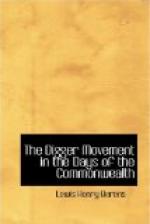At the very outbreak of the Civil War, Cromwell’s aim had been to find “men who know what they fight for, and love what they know,—men as had the fear of God before them, as made some conscience of what they did."[33:1] Such men soon gathered round the great Independent, and he moulded them into the famous Ironsides, by whose aid he turned the tide of defeat at Marston Moor, and gained the glorious victories of Naseby, Preston, Dunbar, and Worcester. Such men stood by his side at the momentous Army Council at Windsor, May 1st, 1648, when it was solemnly resolved, “not any dissenting,” “that it was our duty, if ever the Lord brought us back again in peace, to call Charles Stuart, that man of blood, to account for the blood he had shed, and mischief he had done to his utmost, against the Lord’s cause and people in these poor nations."[33:2] It was such men who, on December 6th, 1648, to save the kingdom from a new war or from a peace destructive of everything they had fought for,[33:3] purged the House of Commons of its “malignant” members; and who cut the Gordian knot of the difficulties that beset the nation by bringing the King, who seemed to them to stand in the way of any and every satisfactory settlement, to trial and execution (January 30th, 1649). Moreover, it was such men who most heartily concurred with the resolution of the House of Commons (February 7th, 1649), “That it has been found by experience ... that the office of a king in this nation, and to have the power thereof in any single person, is unnecessary, burdensome, and dangerous to the liberty, safety, and public interests of the people of this nation, and therefore ought to be abolished.” And, finally, it was such men who were the main supporters of the Council of State to whom, on February 13th, 1649, under the control of the House of Commons, was entrusted full executive authority over the home and foreign affairs of the nation.
FOOTNOTES:
[23:1] Macaulay’s Essays, “John Hampden.”
[24:1] In 1624, Charles had voluntarily sworn to the House of Commons that if he married a Roman Catholic “it should be of no advantage to the recusants at home.” In the autumn of the same year, on his betrothal to Henrietta Maria, sister to the King of France, he solemnly swore to grant the very condition he had previously solemnly sworn never to concede. He came to the throne early in the following year, 1625.
[24:2] Loc. cit.
[24:3] Constitutional History, vol. ii. p. 81.
[25:1] The Apology of the Commons, 1604. See Gardiner’s History of England, 1603-1642, vol. i. pp. 180-185.
[25:2] Ibid. vol. vii. pp. 72-76.
[28:1] Loc. cit.




